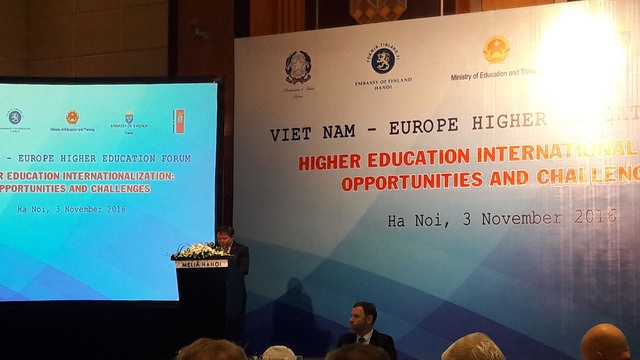Asia/Vietnan/Noviembre de 2016/Fuente: Vietnan News
RESUMEN: Se espera que la cooperación entre Việt Nam y los países europeos en la educación superior se impulse tras el Foro de Educación Superior Việt Nam-UE y las actividades conexas, que se iniciaron esta mañana. Bùi Văn Ga, Viceministra del Ministerio de Educación y Formación (MoET), agradeció las numerosas becas que la UE ha ofrecido a los estudiantes vietnamitas y dijo que Việt Nam También envió a los estudiantes a la UE mediante fondos estatales a través de los proyectos 322, 911 y 599. Sin embargo, Việt Nam y la cooperación de la UE en educación es «modesta» y no ha realizado todo su potencial, añadió.
Cooperation between Việt Nam and European countries in higher education is expected to get a boost following the Việt Nam-EU Higher Education Forum, and related activities, which began this morning.
Speaking at the conference, themed «Higher Education Internationalisation: Opportunities and Challenges,» Bùi Văn Ga, Deputy Minister of the Ministry of Education and Training (MoET), appreciated the many scholarships EU has offered to Vietnamese students, and said Việt Nam itself has also sent students to EU by state funding via projects 322, 911 and 599.
However, Việt Nam and EU cooperation in education is “modest” and has not realised its full potential, he added. Students in Việt Nam are not yet well-informed about the prestigious institutes or universities in Europe.
Thus, the forum was organised by MoET to provide “a chance for universities, lecturers, researchers and education managers to connect; share practical experience on teaching, research and management; explore opportunities for bilateral and multilateral cooperation on joint-training programmes, collaborative research projects, students and lecturers exchange programmes and exchange scholarships; and aim to sign cooperation agreements,” he said.
International mobility in higher education is also high on EU’s agenda, via the «European Region Action Scheme for the Mobility of University Students» (ERASMUS) that enables students to pursue programmes in more than just one university in EU, Tom Corrie, deputy head of cooperation of the EU delegation to Việt Nam, said.
He also noted that even though 15,000 Vietnamese students currently in Europe is an “encouraging” number, and there have been bachelor-master-doctorate exchange programmes between universities in EU and Việt Nam plus 18 research projects were funded under ERASMUS, there is still “plenty of scope for more cooperation and the EU is keen to support this whenever possible.”
Academic cooperation is a natural extension of what he calls “partnership of equals” evidenced by increasingly deepened economic ties and political relations between the two sides.
The issue of teaching foreign languages, especially English, was given much attention in the mid-session Q&A, with many participants stressing on the importance of the English language. Even in pre-university education levels, English must be prioritised should Việt Nam wish to focus on high-quality higher education in the context of international integration in general and when studying abroad in particular.
Based on current stastics on joint-training programmes, Nguyễn Thị Thanh Minh, deputy head of the International Education Development Department (under MoET), called for more joint programmes and capacity building projects for provinces outside of Hà Nội and HCM City, in more diverse majors (aside from economics), and from different countries in the EU bloc.
Exchange programmes, joint research development, students and staff mobility, and export of knowledge consultancy services are four key pillars of Finland’s success in internationalisation of higher education, Kari Kumpulainen, director of the Oulu University Teacher Training School, said.
Other talking points included globalisation and dual-degree training in two institutes; Sweden’s tripartite innovation model between the state, higher education universities, and businesses/employers; and recognition of foreign qualifications and degrees.
Eighty education institutes from EU and Việt Nam attended the forum.
Within the framework of the forum, Sweden’s Uppsala University – the oldest university among Nordic countries – signed memoranda of understanding with Hà Nội Medical University and Việt Nam University of Traditional Medicine on dual degree programmes, cooperation in clinical research, bio-banking and healthcare.
An education fair, titled Higher Education in Europe, will be held tomorrow at the Hà Nội University of Science & Technology by MoET in collaboration with embassies of EU countries.— VNS
Fuente: http://vietnamnews.vn/society/345608/viet-nam-eu-universities-cooperation-gets-more-opportunities.html#hB0yKS66MgBBu2I8.97







 Users Today : 77
Users Today : 77 Total Users : 35460094
Total Users : 35460094 Views Today : 97
Views Today : 97 Total views : 3418728
Total views : 3418728